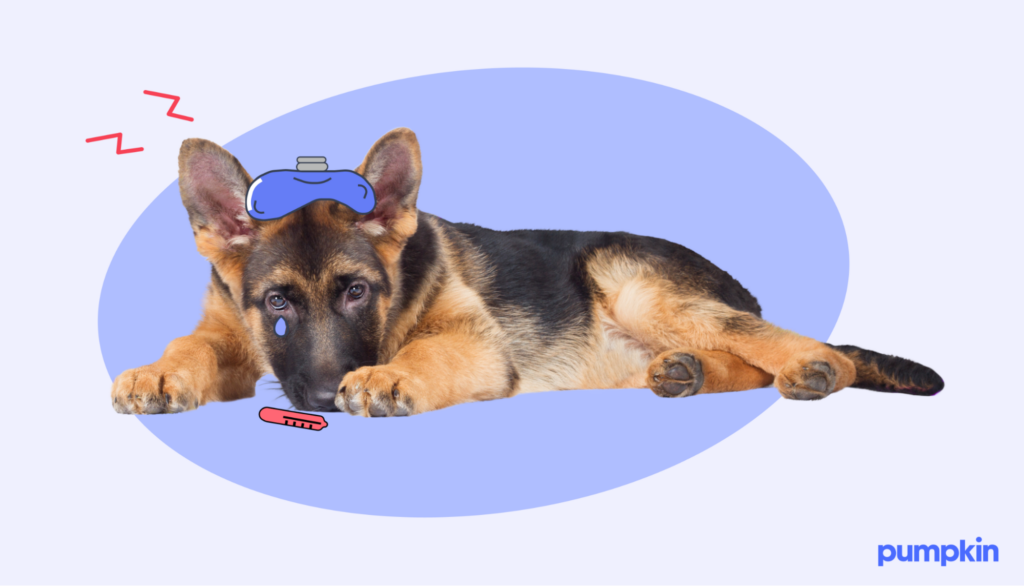- Lynn Guthrie
- Jan 8, 2024
- 6 min read
Key Points:
Dogs can eat plain, unsweetened yogurt in moderation, but some dogs don't like the taste or texture.
Avoid yogurt with added sugars, artificial sweeteners, or toxic fruits for dogs.
Try mixing yogurt with dog-safe fruits and veggies to create healthy smoothies, pupsicles, and other dog treats.
Do you feel guilty eating yogurt in front of your pup? Or, do you wait until they’re not looking before you indulge in this healthy snack?
If those big begging eyes are too much, it may seem easier to sacrifice this probiotic-filled food than say no to your dog.
But what if we told you that most dogs can eat yogurt when served in moderation? As long as it’s free from added sugar, artificial sweeteners, and additives, yogurt is on the “occasional treat” list.
Health benefits of yogurt for dogs
Yogurt contains nutritional components that provide a range of benefits for dogs.
Probiotics
Probiotics are live organisms (usually bacteria, but sometimes fungus as well) that support a healthy digestive system. The bacteria in our gastrointestinal tract are essential for breaking down food, and a healthy gut biome can even support a weak immune system.
Calcium
Calcium builds strong bones and teeth and supports a strong heart and nervous system. Dogs don’t produce calcium naturally, so they need to get it from their diet. If your dog eats food that's
Association of American Feed Control Officials (AAFCO) certified to be complete and balanced, then they will have enough calcium in their diet. However, if you home cook or feed raw, adding yogurt to your pup's diet is a good way to boost their intake of this mineral.
Dietary protein
Protein is an essential nutrient for the growth and maintenance of almost all your dog’s bodily tissues. It supplies the amino acids necessary to build hair, skin, tendons, cartilage, and muscles.
The risks of dogs eating yogurt
Even though yogurt has health benefits, it might not be safe for every dog. Consider these risks before sharing a lick of yogurt with your pooch:
Lactose Intolerance
Milk and yogurt contain lactose, and after they wean from their mother’s milk, dogs don’t produce the enzymes needed to digest these foods properly. Symptoms of lactose intolerance in dogs include:
Lack of appetite
Gas
Bloating or abdominal discomfort
Symptoms of lactose intolerance can occur up to 48 hours after eating dairy.
Look for yogurt with live, active cultures on the ingredient list; these have less lactose than regular pasteurized varieties.

Milk allergies
Yogurt can be safe for dogs, but if they have an allergy to dairy products, it can lead to illness. If your dog has a milk allergy they may experience:
Nausea or lack of appetite
Excessive itchiness around ears
Excessive paw licking
Skin redness
Hives
Swelling of the face
Breathing difficulties
Your vet can tell the difference between lactose intolerance and an allergic reaction. Seek advice if you suspect your dog has a food allergy.
Pet Pro Tip: If you have a dog that is prone to ‘snacksidents’ – you should consider getting a dog insurance plan as soon as possible. It can help you afford the best care in the future by covering eligible vet bills for digestive illnesses, toxic ingestion, and more.
High sugar content
Many yogurts have added sugars for (human) palatability. However, your dog’s digestive system can’t process these sugars, and too much sugar can lead to obesity, diabetes, and dental disease.
Avoid sugary store-bought yogurts that contain fruit, honey, or flavorings. Instead, buy plain yogurt and add fresh fruit yourself.
Artificial sweeteners
Any sugar-free yogurt is a no-no for dogs. These yogurts often contain xylitol, an artificial sweetener that is extremely toxic to dogs. Xylitol is known for causing dangerously low blood sugar levels in dogs and cats, and untreated xylitol toxicity can lead to liver failure and death. This means most “low-sugar” yogurts are off-limits for dogs.
Pancreatitis
Yogurt with a high fat content can inflame the pancreas and cause pancreatitis, which can be fatal.
How much yogurt can your dog eat?
When it comes to treats, 90% of your dog’s daily calories should come from complete dog food, while the remaining 10% can come from treats.
If your dog isn’t lactose intolerant and loves treats like cheese, yogurt is a safe addition to their diet.
According to a veterinarian we consulted for this guide, here’s how much yogurt can give your dog, depending on their size:
Small dogs: 1-2 teaspoons daily
Medium dogs: 1-2 tablespoon daily
Large dogs: 2-3 tablespoons daily
Always start with a small serving and be mindful that allergies may develop over time.
How to feed yogurt to your dog
Dogs can eat plain, unsweetened yogurt as a treat when served in moderation. You can add it to the top of their kibble, let them lick it from a spoon, or create homemade treats.
Plain Greek yogurt is the healthiest choice, and it provides a range of vitamins and nutrients, including calcium and dietary protein. Check the ingredients list to make sure yogurt is free of xylitol, added sugar, and other unhealthy additives.
When introducing new food to your pet, watch them for signs of an allergic reaction. If you notice anything unusual, get in touch with your vet.
Creative ways to serve yogurt to your dog
There’s more than one way to serve yogurt to a dog. Here are some options that both you and your dog can enjoy:
Add fresh fruit to yogurt and give your pet a dog-friendly sundae.
Add a spoonful of yogurt to your dog’s regular kibble as a meal topper.
Freeze fresh fruit and plain yogurt in ice cube trays and create a pupsicle.
Blend yogurt, fresh fruits, and vegetables for a mid-day smoothie.
What dog-friendly fruits pair well with yogurt? Try bananas, strawberries, or blueberries. For a nutrient-packed smoothie, try adding healthy veggies like green beans or sweet potatoes.
Can puppies eat yogurt, too?
Once your pup is on a solid diet, you can give them a taste of yogurt. Most pups start weaning at around 4-6 weeks old, but you should be mindful of serving sizes and ingredients. Just like adult dogs, pups should avoid artificial sweeteners and sugar, so plain Greek yogurt is the safest choice.
Yogurt for dogs: Healthy in moderation
Yogurt is a source of protein, calcium, and probiotics, all of which can benefit your dog's health. Just remember to check the ingredients carefully to make sure there are no sweeteners or additives that could make your dog sick.
Plain Greek-style yogurt is the healthiest yogurt for your dog. You can try adding fresh fruits, veggies, or peanut butter to give this treat an extra boost of vitamins and antioxidants, but don't go overboard. Moderation is key!
A balanced diet is just one part of keeping your dog happy and healthy. Consider a Pumpkin pet insurance plan as a way to help you cover the cost of eligible vet bills if your pup gets sick or hurt, and for some extra peace of mind when you're experimenting with human foods.
Updated on January 8, 2024: A previous version of this article cited a study that claimed the whey in yogurt could support canine dental health. However, the veterinarian who reviewed this article advised us to remove this section, as it's not accurate. According to Dr. Sarah J. Wooten, DVM CVJ, "When fed to dogs in moderation, whey is considered a good source of protein, is easy to digest, and boosts the immune system."
FAQs
Is yogurt good for your dog’s gut health?
Yogurt has a range of health benefits, but it won’t solve the underlying issue if your dog has loose stools, itchiness, or a lackluster coat (all signs of poor gut health). Your vet may recommend your canine take probiotic supplements made specifically for dogs.
Can dogs eat vanilla yogurt?
The safest yogurt for dogs is plain and unflavored. If your dog has an accidental lick of vanilla yogurt, it probably won’t hurt them. But it shouldn’t be a regular part of their diet. Flavored yogurts often have a high sugar content, which can lead to tooth decay, obesity, and more. (Sugar-free vanilla yogurt often contains xylitol, a sweetener that’s highly toxic to dogs.)
Can dogs eat frozen yogurt?
A small amount of plain frozen yogurt would not be toxic to your dog, but virtually all frozen yogurt has some type of flavoring or sweetener. For this reason, the veterinarian we spoke to said that frozen yogurt is a no-go for dogs. If you want to give your dog a frozen treat, it’s best to freeze plain yogurt yourself in ice cube trays. You can add fresh, pureed fruit such as strawberries or bananas to the yogurt before freezing.
REFERENCES
https://www.akc.org/expert-advice/health/dog-probiotics-for-yeast/
https://www.waxhaw.providencevets.com/site/blog/2022/03/15/should-my-dog-take-calcium-supplements
https://jasbsci.biomedcentral.com/articles/10.1186/s40104-022-00827-8
https://nativepet.com/blogs/health/can-dogs-be-lactose-intolerant
https://petnutritionalliance.org/resources/calorie-calculator?type=dogs

